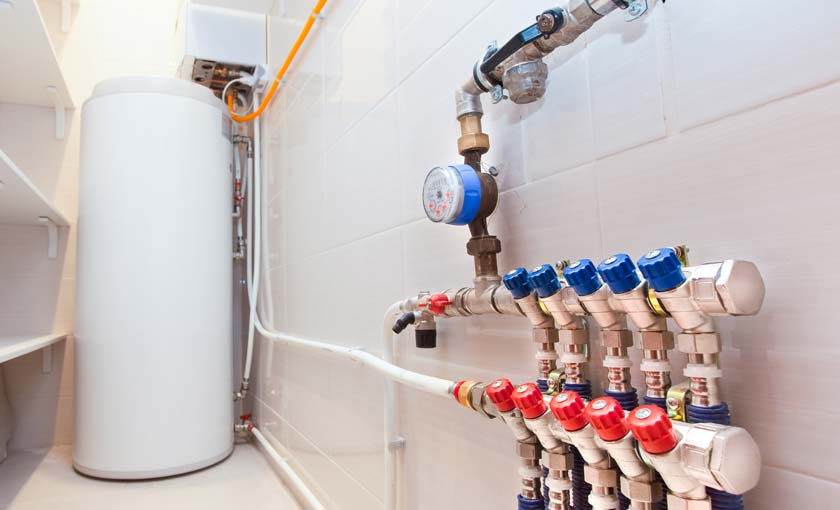Commercial Heating: How to Improve Efficiency & Decrease Costs

Heating in a workplace is crucial for a number of reasons. First and foremost, it keeps your employees and visitors comfortable – if used correctly. Secondly, in certain environments, it will be needed to keep produce fresh, materials safe and equipment running. If you run a business, you’ll no doubt be aware of the associated costs where heating is concerned. Here, we’ll look at the best ways to improve the efficiency of your heating, and in turn, reduce the amount you pay for it.
Control the temperature
It sounds obvious to say, but controlling the way that you use your heating is the first step towards ensuring it runs efficiently. In a workplace, where lots of people with different preferences are situated, it can be common to find the thermostat being altered every 15 minutes. While this may feel better for some people, the constant heating up and cooling down means the system uses a lot of energy, therefore costing you more money.
Find an agreeable temperature – in certain environments, the temperature may be dictated by the equipment, materials or produce you have in your premises – and leave the thermostat there. This will save money in the long term. If there is a particular issue with people fiddling with the thermostat all the time, you can even invest in anti-tamper devices to ensure people can’t constantly tweak the temperature.
Invest in a quality product
The quality of your heating system can directly affect the amount you pay for your heating. As time goes on and our heating systems age, they will start to lose some of their efficiency. Combine this with the potential for breakdowns and faults and you can end up spending a lot more money on your heating than you need to. Modern systems are designed with efficiency as a priority, and advances in technology mean that heating systems are more efficient than ever before.
Service and maintenance
Regular servicing and maintenance is one of the most efficient and effective ways of keeping your heating running and your costs down. With scheduled maintenance, qualified engineers will be able to catch any faults before they worsen, which means the risk of being left with a broken down heating system is almost eliminated. Consider the alternative, which is paying for emergency repairs at short notice, in addition to the discomfort from failed equipment and it is clear that regular servicing is a wiser option.
Research different types of heaters
As mentioned earlier, technology’s advancements mean that heating systems have undergone something of a revolution. There are a few different types of heaters, each with their own benefits and unique features:
Radiant heaters
These heaters are best used in environments where high ceilings are prominent. Hung from these ceilings, radiant tube heaters are very accurate – they only supply heat to where it’s needed, which means they are extremely useful for direct spot heating.
Warm air heaters
Consisting of three key parts: a burner, a heat exchanger and an electric fan, these systems direct heat to specific parts of a building. They can also be purchased as heating and ventilation systems (HVAC), meaning they can be used for warming and cooling. These systems are more appropriate for buildings that are occupied by people and/or livestock, and where high air flows are not prominent.
Smart heating
Technology has infiltrated almost every sector, and the world of heating and ventilation is one such sector that is benefitting from the innovations in the technological world. In years past, we would have to manually alter and fiddle with thermostats and boilers to change the temperature in properties. Now, we can set temperatures, schedule the warming up and cooling down of rooms even if we’re in a different city, as well as review helpful analytical data of how energy is used.
Insulation
Insulating your property is one of the most well-known and effective ways of saving on heating costs. Insulation keeps your premises cooler in the warmer months, and warmer in the cooler ones. This helps reduce the amount of time you spend with the heating on, which will help decrease your costs. It is worth bearing in mind that while the initial outlay for insulation can be seen as pricey, the savings over time will far outweigh the original expenditure.
Incentives
There are a few government incentives available to help businesses make the most of their heating systems. One such scheme is the Non-Domestic Renewable Heat Incentive (RHI). It is open to commercial, industrial, non-profit and public sector organisations, designed to encourage and reward them for taking up renewable heat installations.
This scheme offers quarterly payments across 20 years to those with eligible installations, so if your business is fit to apply, it is certainly something you should consider. You can find out more about it here.
—
As you can see, there are plenty of ways you can improve the efficiency of your commercial heating and save yourself some money in the process. For information about our commercial gas heating services, or if your commercial gas heating system is in need of inspection, repairs or maintenance, get in touch with the experts at Express Gas Solutions today.













